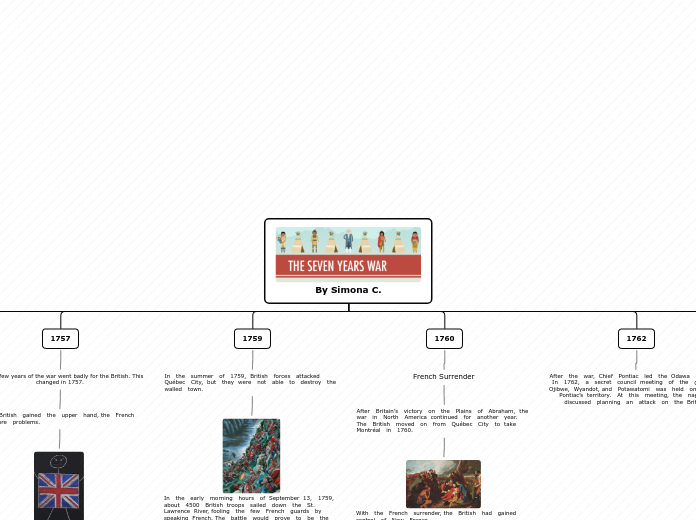By Simona C.
1770
New Order
By 1770, the French people understood that their religion, language, and way of life were still under attack as the British continued their attempts at assimilation.
Carleton’s efforts paid off. The British government passed the Québec Act, 1774, which returned to the French many of the rights they had lost with the Royal Proclamation.
1763
On May 5, 1763, the Odawa, Potawatomi, and Wyandot nations met in council and made a decision to continue to fight against the British.
In May and June 1763, the allied First Nations led successful attacks on eight British-held posts around Lake Erie and Lake Huron. These attacks, such as the one on Fort Michilimackinac (on the shores of Lake Michigan), often took the British by surprise.
Trade between First Nations and the French came to an end after the war. The British limited First Nations’ access to European goods, such as weapons, tools, and clothing. They also stopped paying established prices for First Nations goods.
The British delivered a Royal Proclamation in 1763, outlining new rules for all the people who were living in North America. This proclamation, or official statement, announced that the British were taking over the government of Québec.
In July 1764, more than 2000 people representing 24 First Nations and members of the British monarchy met to sign the Treaty of Niagara. Under the terms of the Treaty of Niagara, the British promised to keep settlers out of the Ohio Valley. The promises made were symbolized and preserved in the wampum belt shown
1762
After the war, Chief Pontiac led the Odawa Nation. In 1762, a secret council meeting of the Odawa, Ojibwe, Wyandot, and Potawatomi was held on Chief Pontiac’s territory. At this meeting, the nations discussed planning an attack on the British.
1760
French Surrender
After Britain’s victory on the Plains of Abraham, the war in North America continued for another year. The British moved on from Québec City to take Montréal in 1760.
With the French surrender, the British had gained control of New France
1759
In the summer of 1759, British forces attacked Québec City, but they were not able to destroy the walled town.
In the early morning hours of September 13, 1759, about 4500 British troops sailed down the St. Lawrence River, fooling the few French guards by speaking French. The battle would prove to be the beginning of the end of New France. Québec City fell to the British in less than one hour. This was an important win for the British, since the French were not able to recover from the loss.
1757
The first few years of the war went badly for the British. This changed in 1757.
As the British gained the upper hand, the French faced more problems.
Subtopic
WAS THE BRITISH VICTORY INEVITABLE?
Britain and France had different strategies when fighting the Seven Years’ War. France focused its attention on fighting in Europe. The British fought in the way that they had always fought on the open fields of Britain and Europe.
FIRST NATIONS ALLIANCES key to French military strategy in North America was alliances with First Nations, such as the Ojibwe. Similarly, the Ojibwe sought alliances with the French to help protect their interests and ensure their survival in North America. not all first nations allied with the french.
1754
In 1754, tensions among the French, the British and First Nations living in North America had been building for more than a decade.
Battle for Fort Duquesne Many historians point to the battle for Fort Duquesne as the start of the Seven Years’ War. The British were forced to leave the area, but they returned multiple times to try to capture the fort from the French.
Economic Interests In 1754, the British sent troops to North America and attacked French forts. The British also began seizing hundreds of French merchant ships

